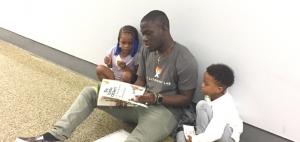Eric Horsley didn’t come from a family of educators, and he was the first in his family to walk across the stage to receive his high school diploma. But it hasn’t taken him long to pick up the language of the teaching profession.
He talks about examining assessment results, choosing the students he will tutor based on that data and finding books that target the particular early literacy skills where children need help. “I can see the growth,” he said in an interview.
A 2017 graduate of Eastern Senior High School in Washington, D.C., Horsley has spent the past school year working in a pre-K classroom at Neval Thomas Elementary School as part of the Leading Men Fellowship, a project of The Literacy Lab designed to attract young black males into early-childhood education and support them as role models in their communities.
“We want them to see this as a college and career pathway,” said Ivan C. Douglas Jr., a program manager at The Literacy Lab.
‘Educationally relevant’
According to federal data, black males make up only 2% of the teacher workforce and likely much less in preschool and the early grades. But studies continue to show better educational outcomes for black male students when they have a black male teacher, compared with when they don’t — including being less likely to drop out and more likely to apply to a four-year college. Referring to research http://ftp.iza.org/dp10630.pdf by Seth Gershenson of American University and three co-authors, David Figlio, dean of the School of Education and Social Policy at Northwestern University, wrote in this article that the benefits are especially strong for black males from low-income homes.
“For instance, they find that a disadvantaged black male’s exposure to at least one black teacher in elementary school reduces his probability of dropping out of high school by nearly 40%. This estimated effect is not just statistically significant, but also highly educationally relevant,” he wrote.
School leaders also recognize how this mismatch affects their students.
“As a leader of a 98% African-American student body, I feel it is important for students to find someone they can see themselves in, look up to and aspire to be,” Royston Maxwell Lyttle, the principal for 1st-3rd grades at the Eagle Academy Public Charter School in Washington, D.C., wrote in an Education Post piece. “Boys who grow up with only female teachers and role models don’t have this opportunity.”
The Leading Men Fellowship began in the 2016-2017 school year with 10 fellows, followed by 10 the second year. This fall, the cohort will expand to a total of 30 in six sites — D.C, Baltimore, Richmond, Va., Kansas City, Mo., Springfield, Mass., and Milwaukee. The fellowship, which initially launched as part the District of Columbia Public Schools’ Empowering Males of Color effort, is a recent winner of the Zaentz Early Education Innovation Challenge, a project of the Saul Zaentz Early Education Initiative at the Harvard Graduate School of Education.
That award, as well as a recent anonymous donation of $200,000, will allow the program to spread to additional sites, Ricardo Neal, the director of innovation and strategy for The Literacy Lab, said in an interview. A former administrator at Eastern High, he recruited Horsley to the program.

